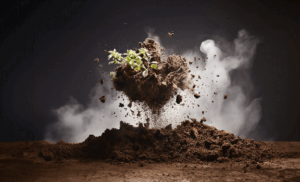Marine Life in the Quran and Ecosystem Diversity
The Quran, as a divine guide, is not only a spiritual compass but also a profound reflection of the natural world. Among the many wonders it touches upon, marine life holds a unique place. The oceans, teeming with diverse creatures, are mentioned numerous times in the Quran as signs of Allah’s creative power. These references not only highlight the biological richness of marine ecosystems but also emphasize the interconnectedness of life on Earth. In this article, we explore how Quranic revelations align with modern ecological insights, showcasing the balance and diversity of marine ecosystems.
Marine Life in Quranic Revelation
The Sea as a Sign of Allah
The Quran refers to the sea as one of the great signs of Allah, a realm of mystery and beauty created to reflect His might and mercy. Verses like “And it is He who subjected the sea for you…” (Quran 16:14) express the sea’s significance.
References to Aquatic Creatures
The Quran mentions various aquatic beings, such as fish and pearls, symbolizing sustenance and beauty. These references illustrate how marine resources are blessings granted to humanity.
The Sea’s Role in Sustenance
Verses acknowledge that from the sea we extract both food and ornamentation. This aligns with modern knowledge of the ocean’s contribution to food security, especially in coastal communities.
Ecosystem Diversity in the Quran
Diversity as a Divine Design
The Quran proclaims that Allah created all creatures in pairs and in varying forms. “And of everything We have created pairs…” (Quran 51:49) reflects biological diversity, including within marine environments.
Life Beneath the Waves
Though not exhaustively detailed, the Quran alludes to unseen creatures in the depths. The diversity of species beneath the surface—from plankton to whales—shows the intricacy of Allah’s creation.
Environmental Harmony
Marine ecosystems reflect a delicate balance, echoing the Quranic theme of mīzān (balance). Disrupting one element can affect the whole system, a principle supported by ecological studies.
The Ocean’s Layers and Depth
Darkness Upon Darkness
The Quran says, “…or like the depths of darkness in a vast deep sea…” (Quran 24:40), which corresponds with the scientific discovery of the ocean’s layered darkness due to depth and light absorption.
Pressure and Hidden Life
Though the Quran doesn’t explicitly mention pressure, its descriptions of deep darkness imply a mysterious, inaccessible world—where life still thrives under extreme pressure.
Zones of the Ocean
Today we classify oceans into zones—sunlight, twilight, and midnight zones. This modern classification echoes the Quran’s poetic references to depth and darkness.
Marine Resources and Human Benefit
Sustenance from the Sea
The Quran encourages reflection on food drawn from the sea. Seafood remains a critical protein source globally, especially for low-income communities.
Pearls and Corals
Mentioned in Surah Ar-Rahman, pearls and coral are marine treasures valued for beauty and trade—symbolizing both spiritual and material blessings.
Maritime Travel and Trade
The Quran mentions ships traversing the sea, pointing to the ocean’s role in global connectivity and commerce, crucial for human development.
Marine Ecosystems and Environmental Balance
- Oceans regulate global temperature and climate.
- Marine life contributes to oxygen production through phytoplankton.
- Coral reefs serve as natural barriers against coastal erosion.
- Biodiverse seas sustain life cycles of many species, including humans.
Threats to Marine Biodiversity
- Overfishing disrupts natural species balance.
- Pollution and plastics damage aquatic habitats.
- Climate change causes ocean acidification and coral bleaching.
- Oil spills and industrial waste harm marine organisms.
Quranic Lessons on Environmental Responsibility
- Humans are stewards (khalifa) of Earth, including its waters.
- Wastefulness (israf) is condemned in Islam.
- Conservation is aligned with gratitude to the Creator.
- Sustainability reflects Islamic principles of balance and justice.
Scientific Insights Echoing Quranic Wisdom
- Modern marine biology confirms complex interdependence among marine species.
- Ocean currents maintain ecosystem and climate equilibrium.
- Bioluminescence and deep-sea creatures reveal divine creativity.
- Exploration reveals how much remains hidden in the oceans—like the mysteries the Quran alludes to.
Conclusion
The Quran’s references to marine life are not mere poetic flourishes but divine nudges to reflect, respect, and protect the ecosystems entrusted to us. These verses harmonize beautifully with ecological science, illustrating a deep understanding of environmental balance. At Muhammadan Quran School, we encourage learners, both children and adults, to explore such connections through our online Quran classes. Understanding the Quran can lead us to be more conscious and responsible caretakers of the Earth.











